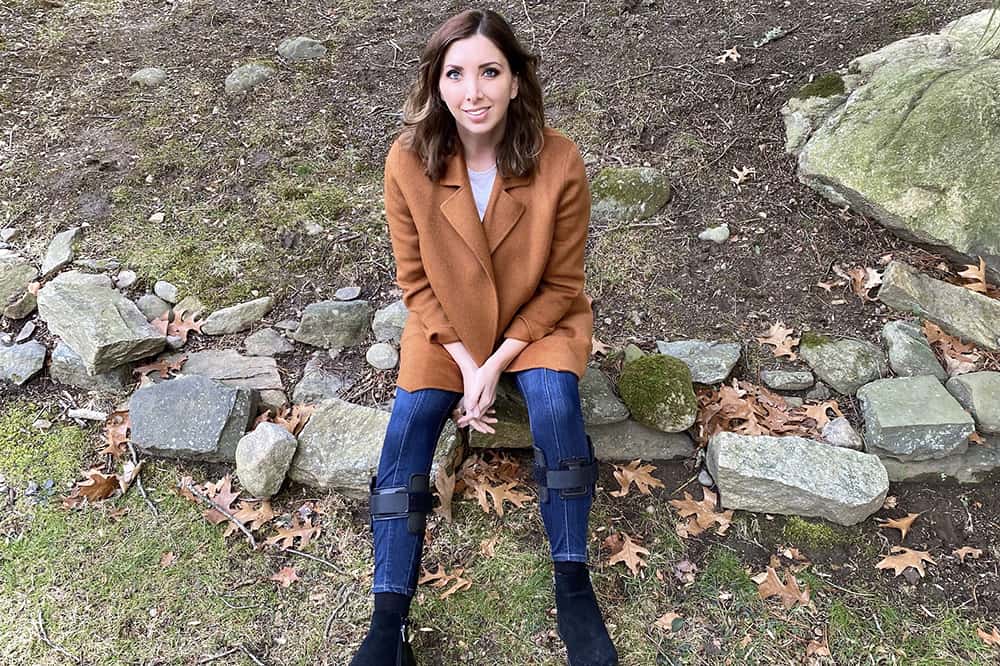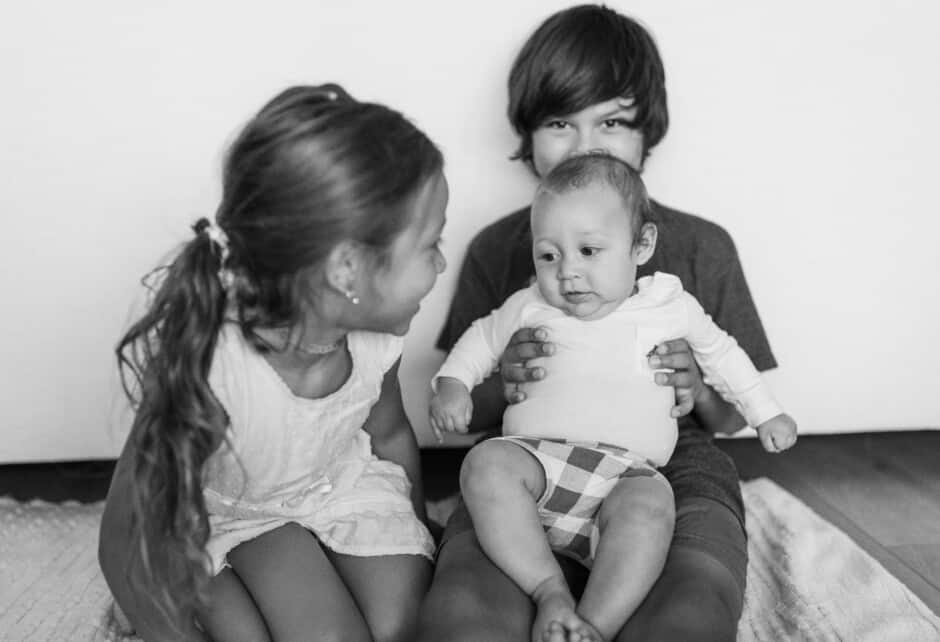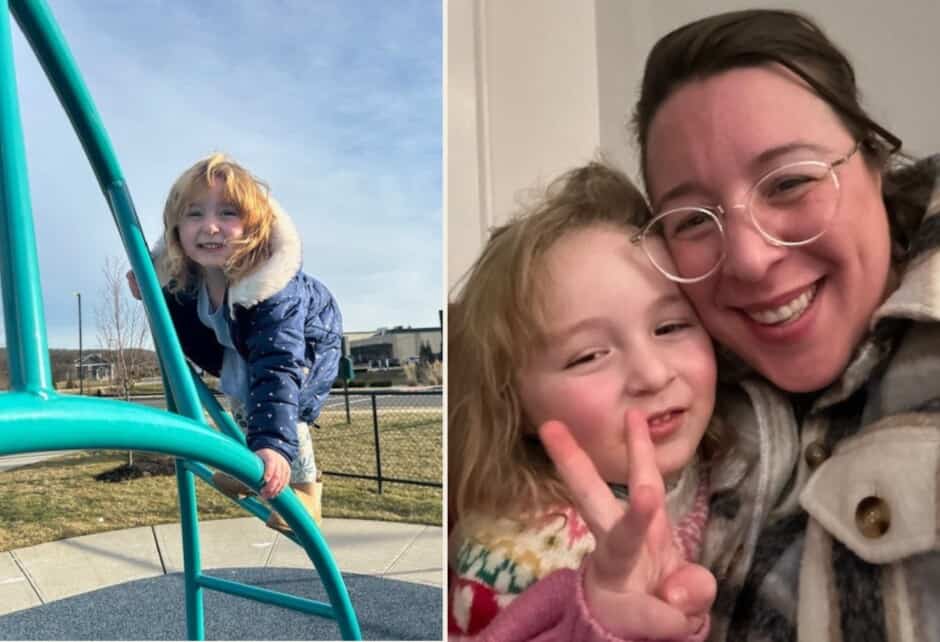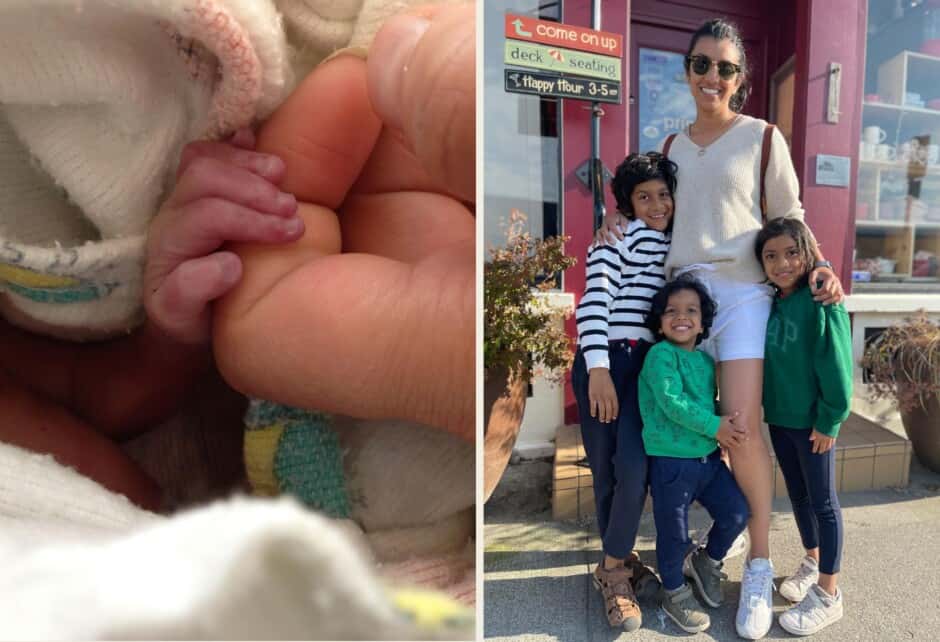
Mom Talk: The Many Gifts Of Parenting With A Disability
Written by Audra DeNicola
Photography by Photo Courtesy of Audra DeNicola
The word disability is often entangled with negativity. But Audra DeNicola is here to say it needn’t be. Born with a rare neuromuscular condition, the New York-based mother of twins and psychotherapist has dealt with physical limitations her whole life. But what these limitations have resulted in is a rich list of abilities and lessons that she is uniquely suited to pass down to her children. Below, she fills us in on the abundance of gifts she—and many other physically disabled parents—has to give.
Parenting young children can be challenging for people with physical disabilities, especially those of us who lack muscle strength and stamina. While those challenges are real and not particularly surprising, what is less widely recognized is that the experience of living with a physical disability can foster skills that are crucial to thriving as a parent, including resilience, empathy, gratitude, and the ability to find joy in the moment each day. As a person with a lifelong physical disability, my experience has both empowered me as a mother and shaped my commitment to raising children to respect and celebrate differences.
Long before I gave birth to healthy and adorable twins in 2016, I considered how my own physical limitations might impact them. I was born with a rare neuromuscular condition called Charcot Marie Tooth syndrome (CMT) and have managed the related bone deformities, muscle atrophy, and pain in my feet and legs throughout my life. I had the first of many reconstructive orthopedic surgeries when I was ten years old and my most recent surgery in 2020, at age thirty-six. Apart from post-surgery recoveries, when I relied on wheelchairs or crutches for mobility, I generally walked with an impairment that most people did not notice. After my most recent surgery, however, my disability became clearly visible to others, because I now use customized carbon fiber leg braces to walk for a large part of each day.
Adapting quickly to challenges is essential not only to living with a physical disability, but also parenting. Growing up, I had to be creative to keep up with other kids and navigate my surroundings. Similarly, parents are constantly called upon to be inventive and flexible—whether by finding ways to remain lucid on little sleep, modify family schedules, or suddenly child-proof every household object in sight—and I am grateful for having had practice developing this kind of adaptability before becoming a parent myself. For example, re-learning how to walk after my first major surgery taught me how to set my expectations appropriately for parenting tasks like establishing good sleep habits with my children because, by the time I embarked on such tasks, I was comfortable using a meditative mindset to take gradual, calculated steps that would build lasting progress. In other words, I was not oriented toward quick-fix solutions that ultimately do not work.
Perhaps even more helpful to being a parent is my longstanding relationship with gratitude. Physical pain and mobility limitations are regular reminders for me never to take moments of ease and abundance for granted. I validate my emotions as they are, but I always pivot to naming what I am grateful for. This gratitude practice is what sustains my energy and optimism. I visualize how things could be more difficult (for example, I might remind myself, “What if I didn’t have health insurance for that surgery?”) and, thus, I appreciate what I do have even more.
While I sometimes feel frustrated that wearing leg braces is cumbersome and unexpected (given the number of reconstructive surgeries that I have had), I am nevertheless grateful that the technology to make them exists and for how helpful they have been to keep me active each day. I am also grateful that my condition is not life-threatening and that my children do not have it. I am grateful that I can navigate my disability alongside my loving spouse and that we have sufficient resources to handle disability-related costs that so often devastate families who struggle to find affordable health insurance in the absence of a universal social safety net. I also know that the privileges that I experience as a white, cisgender woman have shielded me from the harshest ramifications of being disabled. That is in no way to say that I am grateful for injustice, but rather, that this recognition helps me to keep my struggles in perspective and recognize how relatively fortunate I am.
Despite occasional frustrations, since my first day as a parent, I have felt equipped to savor the joy in each day, largely because of challenges that I experienced as a child and young adult. Being laughed at when I would trip and fall or “walk funny” taught me the importance of building an internal reserve of self-confidence and a repertoire for confronting bullies. Re-learning how to walk taught me how to pace myself. Not being able to participate in certain activities, such as any activity that required running or jumping, taught me empathy because, during times when I was included, I recalled how discouraging it felt to be excluded. Having to sit on the sidelines because of my physical limitations taught me to be present in the moment and derive joy from what I could do, such as getting absorbed in music and films. The skills that I learned through these experiences have helped me immerse myself in the world of babies and young children. After all, children are our greatest experts at living in the here-and-now, and the more present we can be in the moment as adults, the more rewarding our experiences tend to be.
While parenting with a disability can be full of life-affirming richness, I have also learned to beware of my own lurking perfectionistic tendency to overcompensate for perceived or actual limitations. For example, as a new parent, I was determined to nurse my twins. Nothing wrong with that. I was lucky to be able to do it, and I loved the bonding of that unique time with my children. The problem was that no matter how much tandem nursing and pumping for back-up supply exhausted me, I never allowed myself to supplement feedings for many months (despite having what I later learned were painful episodes of undiagnosed recurrent appendicitis). In my mind, giving my body permission to take a break and ask for help by way of formula would have confirmed the worst things that had ever been assumed or said about my disability: that I was less capable than others. While I felt that parents without disabilities were free to nurse, supplement, or formula-feed—and I respected their different approaches—I put undue pressure on myself to prove my value and capability to overcompensate for my physical disability.
Reflecting on my experience as a parent with a disability has helped me adjust the all-or-nothing standards that I placed on myself and find a more sustainable balance for my children and me. While I refuse to cut corners or short-change my children because of my disability, I know that I have to take care of myself as well. With this more mindful approach, I strive to prioritize commitments and say no to extraneous obligations that would throw off this balance. For example, in order to allow time to restore and reconnect with one another, I try to balance my family’s regular outdoor excursions with intentional downtime at home. While my children have seemingly endless stores of energy, they benefit from that rest time as much as I do.
My hope is that I can pass on the lessons that I have learned from my disability to my children to help them build self-confidence and problem-solving skills. There are opportunities to do so every day. For instance, when I experience pain with my feet, I don’t pretend that everything is perfect—which would not work anyway given that children can sense a lie from a mile away—but I never catastrophize the situation either. Children learn more from observing their parents than from anywhere else, and I try to model how we can talk about my difficulties in a proactive way to help them learn how to handle challenges that they will face in their own lives. Perhaps partly as a result of this approach, my children are eager to try new things, from plunging face first into the water at swim lessons to trying a wide array of new foods.
Having this form of “otherness” in our family has also enabled my children to begin to develop a nuanced understanding of body differences and learn to challenge exclusionary and discriminatory practices. Based on representations of people with physical disabilities in our popular culture, children often equate people who use mobility aids, such as canes or wheelchairs, with being hospitalized or elderly. As a person with a disability, I show them how I use leg braces—which are a lot like a cane or a wheelchair, even though I am healthy and (relatively) young—to help them understand that there is a diverse spectrum of people with disabilities. From there, we have important conversations about the nuances of race and gender and how the images we see in many books and on television too often portray people in simplistic or stereotyped ways that do not reflect the reality or richness of their lives.
The experience of living with a physical disability varies from person to person. For many of us, it can be a source of strength as a parent, but I rarely see it discussed that way outside of my own family and disability activism circles. By sharing my experience as a parent, my goal is to remind people that “disability” is not a bad word and that disabled lives are not uniform or one-dimensional. Having once felt self-conscious about living with a disability, I am now proud of how it enhances my family. As my children grow up, I hope that we will see more diverse representations of parents and families, and that such representations will better connect and empower us all, as we each do our best to balance our unique strengths and vulnerabilities.
Are you a mother with something to say? Send us an email to be considered for our “Mom Talk” column.
Share this story



